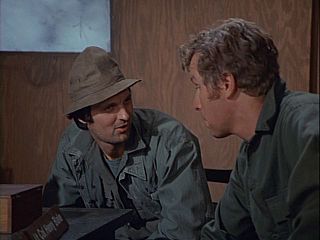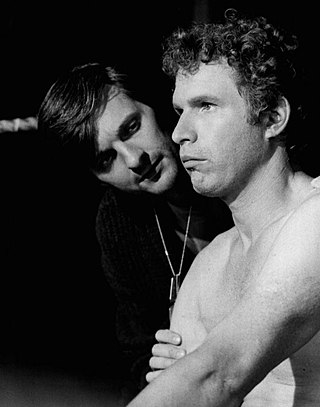Related Research Articles

The pilot episode of M*A*S*H, the first episode of the first season was broadcast on September 17, 1972, although the initial script was first written in November 1971. The episode was written by Larry Gelbart and directed by Gene Reynolds, who received the Directors Guild of America Award for it. It was also nominated for two Emmys for its direction and writing.
"Chief Surgeon Who?" is the fourth episode of the television series M*A*S*H.
"Yankee Doodle Doctor" is an episode of the television series M*A*S*H. It was the sixth episode broadcast and aired on October 22, 1972, and it was rerun April 8, 1973. It was written by Laurence Marks and directed by Lee Philips.
"Bananas, Crackers and Nuts" is an episode from M*A*S*H. It was the seventh episode broadcast and aired on November 5, 1972 and repeated April 22, 1973. It was written by Burt Styler and directed by Bruce Bilson.
"Goodbye, Farewell and Amen" is a television film that served as the series finale of the American television series M*A*S*H. The 2½-hour episode first aired on CBS on February 28, 1983, ending the series' original run. The episode was written by eight collaborators, including series star Alan Alda, who also directed. As of 2024, it remains the most-watched series finale and single episode of any television series in U.S. history, and for twenty-seven years was the most-watched single broadcast in television history.
"Tuttle" is an episode from the television series M*A*S*H. It was the 15th episode broadcast and aired on January 14, 1973. It was written by Bruce Shelly and David Ketchum and directed by William Wiard. This episode was nominated for a Writers Guild Award.
"Henry Please Come Home" was the ninth episode of the first season of the TV series M*A*S*H. It originally aired on November 19, 1972. It was written by Laurence Marks and was directed by William Wiard.
"The Ringbanger" was the 16th episode of the first season of the TV series M*A*S*H. It originally aired on January 21, 1973.
"The Longjohn Flap" is the 19th episode of the first season of the TV series M*A*S*H. It originally aired on February 18, 1973, and was the first episode of M*A*S*H to be written by series star Alan Alda.
"Sticky Wicket" is the 21st episode of the first season of the TV series M*A*S*H. written by Richard Baer with the teleplay written by Laurence Marks and Larry Gelbart, it originally aired on CBS-TV on March 4, 1973.
"Major Fred C. Dobbs" is the 22nd episode of the first season of the TV series M*A*S*H. It originally aired on March 11, 1973.
"Abyssinia, Henry" is the 72nd episode of the M*A*S*H television series and the final episode of the series' third season. It was written by Everett Greenbaum and Jim Fritzell, and it first aired on March 18, 1975. The episode is notable for its shocking ending, in which the unit's amiable commanding officer Lieutenant Colonel Henry Blake receives an honorable discharge and leaves for home but, in the final scene, is reported killed by enemy fire. This ending prompted more than 1,000 letters to series producers Gene Reynolds and Larry Gelbart, and drew fire from both CBS and 20th Century Fox.
"To Market, to Market" is the second episode of M*A*S*H. It was first aired on September 24, 1972 and repeated on April 29, 1973. Like many other M*A*S*H episodes, this one parodies army bureaucracy.
"Radar's Report" was the 27th episode of M*A*S*H, and third of season two. The episode aired on September 29, 1973.
"Deal Me Out" was the 37th episode of the M*A*S*H television series and the thirteenth of season two. The episode aired on December 8, 1973.

"Requiem for a Lightweight" is the third episode of the television series M*A*S*H. It was first aired on October 1, 1972 and was repeated on December 31, 1972, the first episode of M*A*S*H to do so. In Watching M*A*S*H, Watching America, a sociological examination of M*A*S*H as an illustration of shifting American values in the 1970s and early 1980s, James H. Wittebols cites this episode as an example of the sexual humor which was common in early M*A*S*H episodes, but downplayed later in the program's history.
"As Time Goes By" is the 255th episode of M*A*S*H, as well as the last episode filmed. The episode aired on February 21, 1983 on CBS. As it was the final episode filmed they took a moment to pay tribute to the characters who had left the series before its conclusion. It also introduces the character of Soon-Lee, who would play a vital role in the series' final episode and the short-lived spin-off AfterMASH.
"Fallen Idol" is the third episode of the sixth season of the American situation comedy-series M*A*S*H and its 125th overall. The episode aired on CBS on September 27, 1977 and is the first episode where the character of Frank Burns does not play a part in.
"Dear Sigmund" is the 8th episode of the fifth season of the television series M*A*S*H. It first aired on CBS on September 18, 1976. The episode was conceived, written and directed by cast member Alan Alda, who played Hawkeye Pierce on the show.
References
- 1 2 Wittebols, James H. (2003). Watching M*A*S*H, Watching America. Jefferson, North Carolina: McFarland. p. 34. ISBN 0-7864-1701-3 . Retrieved May 16, 2009.
- ↑ Kalter, Suzy (1984). The Complete Book of M*A*S*H . Harry N. Abrams, Incorporated. p. 47. ISBN 978-0-81091-319-6.
- ↑ Wittebols, pp. 161-166
- ↑ "Episode Guide". TV Guide. Retrieved May 15, 2009.
- ↑ "The Classic Sitcoms Guide: M*A*S*H". classicsitcoms.com. Archived from the original on July 23, 2011. Retrieved May 15, 2009.
- ↑ "M*A*S*H: Season One (Collector's Edition) (1972)". Digitallyobsessed.com. Archived from the original on June 13, 2011. Retrieved May 15, 2009.
- ↑ Reiss, David S. (1983). M*A*S*H: the exclusive, inside story of TV's most popular show. Bobbs-Merrill. ISBN 0-672-52656-5.